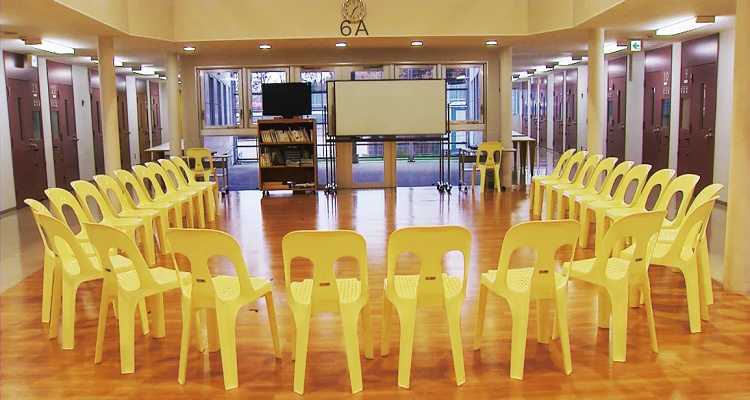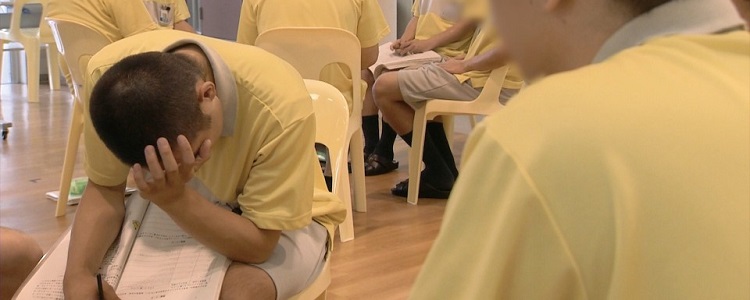
I share my thoughts on Prison Circle, a unique and interesting documentary directed by Sakagami Kaori and presented at the 15th Camera Japan Festival which is taking place on Rotterdam until September 27th and in Amsterdam from October 1st – 4th, 2020.
I would like to thank the organizers of the Camera Japan Festival that allowed me to watch this documentary. Kind gestures like this fuel my passion and makes me continue with this website.

There is an oversaturation of TV shows and full feature documentaries (particularly in western television) that depicts “life behind bars” but only a few are profound and meaningful. “Prison Circle” is a unique and beautifully crafted documentary that focuses on the most important objective of Prisons, the rehabilitation of inmates.
It took six years for Sakagami Kaori to receive permission for shooting inside the Shimane Asahi Rehabilitation Program Center located near the city of Shimane, Japan. It took the director another two years to shoot the film. This Center hosts around two thousand inmates and is for only first timers with low criminal tendencies. The prison is run by a public-private partnership. The Center focuses on education, vocational training, and rehabilitation programs. The Center also stablished a partnership with the local community so the public can understand and support rehabilitation centers like this one.
Throughout the documentary we follow four young inmates, all in their twenties, as they go through a special therapeutic program called TC (Therapeutic Circle). Although this method is not new – it started in US prisons around the 60s – it was introduced in Japan just a decade ago. For entering this program inmates require to show will to change, no severe mental illness and a minimum stay of 6 months. This particular program is designed to run in small groups with no more than 50 inmates.
While inmates must remain silent and follow strict rules inside the Center, at the TC regular group sessions they can talk freely to each other. The TC Unit which is run by certified counselors and social workers with special training, encourage inmates to talk about their upbringings, emotions and feelings, in order to understand their mental and social conditions that led them into Prison. This emotional and tough task is done by using different technics and exercises such as rethinking past situations (cognitive behavioral therapy), create written stories from a trigger sentence (projective technique), empty chair exercises (gestalt therapy) and role playing (psychodrama) to name a few. Sessions are designed in such way that inmates receive continuous feedback from each other, highlighting the importance of mutual-self-treatment in rehabilitation programs.
In most western documentaries about prison we aren’t allowed to empathize with inmates. They are presented as violent animalistic characters which perpetuate the idea that they are people who don’t deserve our mercy and understanding. The way this documentary was shoot and edited allow us to feel close and intimate with the prisoners. It presents them as what they are – human beings who because of bad upbringings, poor decisions and lack of a supporting environment ended up in jail. This doesn’t excuse them from their crimes, but it gives them back their humanity in order for us wanting their recovery. It is important to highlight that faces of all inmates are blurred out to protect their identities.
During the one-on-one conversations with our four protagonists, they share with us their childhood memories, traumas, and difficult situations. These scenes are beautifully represented by sand-animations done by animator Arisa Wakam, giving us a clear view of how cruel their upbring were.
The documentary also shows the importance of close monitorization once the inmates are released from prison. Staff from the TC program gather every 3 months with past patients in small group sessions and support those who still can’t find meaning to their life. The group also gathers once a year to celebrate in a public park with a nice barbeque.
Sakagami’s documentary is a well-crafted film that offers a unique view on a therapeutic program and highlights the terrible consequences of bad and abusive upbringing and the importance of therapeutic communities in the rehabilitation of inmates in Japan.
Sebastián Nadilo
Trailer:
We selected 12 films you shouldn’t miss at the Camera Japan Festival you can read the article HERE: https://asianfilmfestivals.com/2020/09/18/films-shouldnt-miss-camera-japan-festival-2020/
Categories: Review


